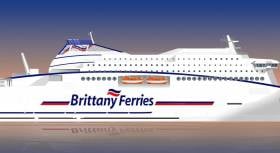Displaying items by tag: Order First LNG newbuild
Brittany Ferries Newbuild Prepares Way for LNG Powered Era
#NewLNGbuild - Irish Continental Group (ICG) parent company of Irish Ferries, in May 2016 announced an order for a new cruiseferry in a German shipyard in which Brittany Ferries have also signed a letter of intent with the same yard to construct a newbuild.
Afloat adds the Irish order to Flensburger Schiffbau (FSG) scheduled for delivery in May 2018 notably differs to that of the French ferry given this newbuild will be powered by liquefied natural gas (LNG). The 42,000 gross tonnage ferry will operate on the English Channel but the Breton based company has a seasonal service to Ireland as referred below.
The announcement re-states Brittany Ferries' commitment to reduce the environmental impact of its operations by embracing new technologies. It follows the completion of a £65m investment in emission-reducing 'scrubber' systems retrospectively fitted to the flagship Pont-Aven (Cork-Roscoff: seasonal) and five other cruise ferries in the company's ten-ship fleet.
According to Brittany Ferries, the newbuild will be one of the cleanest, most environmentally-friendly ships to operate in UK waters because LNG emits less carbon dioxide during combustion than marine fuel oil and burns with no smoke. In addition it is free of sulphur and is very low in nitrogen oxide emissions.
Christophe Mathieu, CEO, Brittany Ferries said: "The signing of this letter of intent with the Flensburger shipyard is a concrete step towards the construction of a new generation of Brittany Ferries ships. Despite Brexit, we remain confident in our ability to continue to grow and modernise our route network, serving both tourism and trade in the regions of western Europe."
More than four in five people travelling on the French company's ships are British and more than 2.4 million passengers were carried in 2016. A final contract for the 1,680 passenger and 257 cabin vessel is expected to be signed in spring 2017, following which construction will start.
The new ship is expected to launch in 2019 on the Portsmouth-Caen route which offers three daily return sailings. It will operate in tandem with popular cruise ferry, Mont St Michel, launched in 2002.
























































